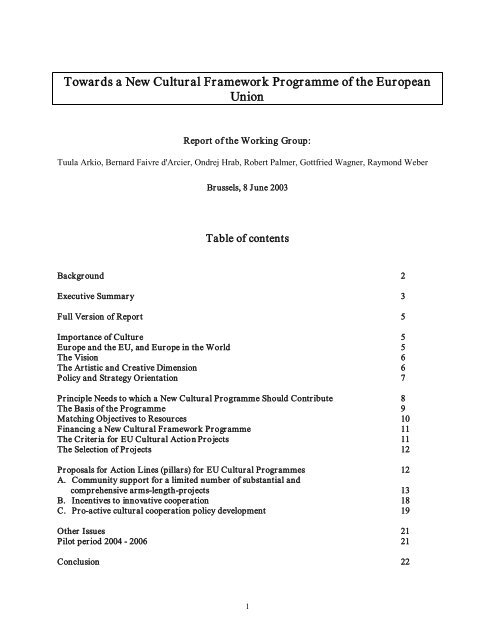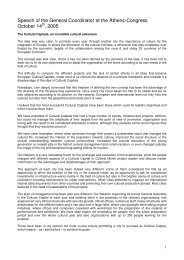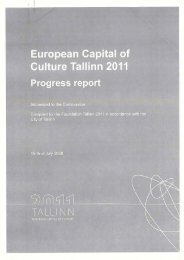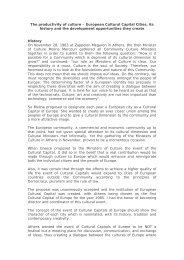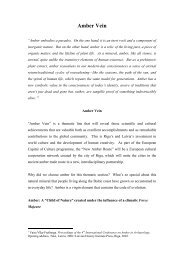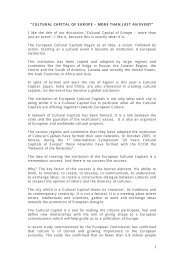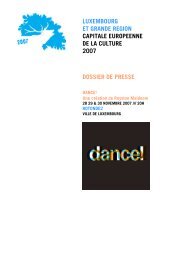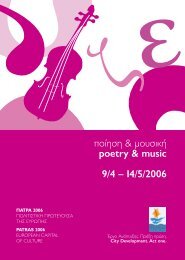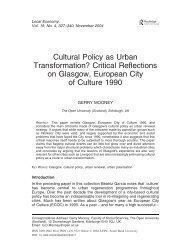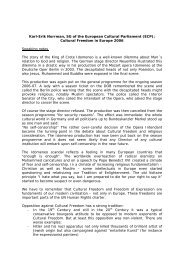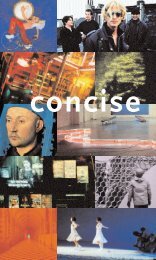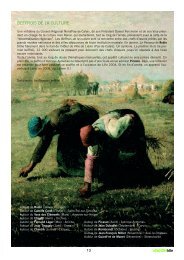Towards a New Cultural Framework Programme ... - ecoc-doc-athens
Towards a New Cultural Framework Programme ... - ecoc-doc-athens
Towards a New Cultural Framework Programme ... - ecoc-doc-athens
Create successful ePaper yourself
Turn your PDF publications into a flip-book with our unique Google optimized e-Paper software.
<strong>Towards</strong> a <strong>New</strong> <strong>Cultural</strong> <strong>Framework</strong> <strong>Programme</strong> of the EuropeanUnionReport of the Working Group:Tuula Arkio, Bernard Faivre d'Arcier, Ondrej Hrab, Robert Palmer, Gottfried Wagner, Raymond WeberBrussels, 8 June 2003Table of contentsBackground 2Executive Summary 3Full Version of Report 5Importance of Culture 5Europe and the EU, and Europe in the World 5The Vision 6The Artistic and Creative Dimension 6Policy and Strategy Orientation 7Principle Needs to which a <strong>New</strong> <strong>Cultural</strong> <strong>Programme</strong> Should Contribute 8The Basis of the <strong>Programme</strong> 9Matching Objectives to Resources 10Financing a <strong>New</strong> <strong>Cultural</strong> <strong>Framework</strong> <strong>Programme</strong> 11The Criteria for EU <strong>Cultural</strong> Action Projects 11The Selection of Projects 12Proposals for Action Lines (pillars) for EU <strong>Cultural</strong> <strong>Programme</strong>s 12A. Community support for a limited number of substantial andcomprehensive arms-length-projects 13B. Incentives to innovative cooperation 18C. Pro-active cultural cooperation policy development 19Other Issues 21Pilot period 2004 - 2006 21Conclusion 221
4. The future programme must be clearly focused and should operate on three pillars:• Community support for a limited number of substantial and comprehensive “armslength”projects, using strong platforms that offer thematic cohesion, quality,professional management, and facilitate coherent sub-projects by smaller partners.Criteria for platforms are defined in the report.• European incentives to innovative cooperation by member states/regions/municipalities, cultural institutions and the independent sector, generating addedEuropean value.• Pro-active cultural cooperation policy development (including new tools forcooperation).5. The combination of strategic development and delegation to platforms, the support to asubstantially fewer number of substantive projects (with clear objectives and withinthematic priorities), and the offer of incentives to encourage new commitments formultilateral cultural cooperation, as well as innovative instruments to stimulating new formsof cultural cooperation, will increase the impact of cultural creators and operators.6. The twin challenge of effectiveness and democratic legitimacy, which Europe in a globalcontext is facing, requires a convincing cultural response. European citizenship in an opencommunity needs participation and symbolic imagination. However, all current emblematicprojects, including the programme of European Capitals of Culture, need radical reconsideration.7. Pilot projects should be developed in the period 2004 - 2006, to test out and gain experiencefrom the new approach and priorities. An independent working group of experts should beretained to comment on and help monitor progress.4
FULL TEXT OF WORKING GROUP REPORTIMPORTANCE OF CULTUREThe debate on a new EU cultural framework programme takes place at a time when the European Unionfaces major challenges concerning its economic performance, its internal cohesion, its external role andthe impact of enlargement.The Working Group strongly believes that the European Union is not only facing economic and technicalchallenges, but also a more comprehensive level of interaction among peoples, cultures and nationalidentities. “The EU is failing to giving an adequate response to concerns of its citizens in a number ofareas. There is a growing sense of insecurity among its citizens, an increasing fear of the unknown”. iIt seems imperative to recognise cultural aspects of the integration process and to develop new ways ofcultural cooperation as a key to develop a new vision for a more coherent and sustainable civil society ona European level. Issues of multiple identities and intercultural competencies, and of a growing sense ofbelonging to Europe are at the core of cultural interaction. These are additional to current preoccupationswith the diffusion of knowledge and the importance of heritage.From the producers, actors and organisers in the cultural sector, there is a growing awareness of andreflection on the European challenges, and dedication to expanding European and internationalcooperation. The Working Group became aware of the extent to which groups and individuals acrossEurope wish to deepen their knowledge and understanding of one another by building networks, creatingmovements and sharing information and skills. Support and encouragement from the European Union forcultural initiatives by artists, independent cultural groups, networks, foundations and member states mustbe a key issue to help provoke an innovative re-definition of the relationship between European civilsociety and European governance.As far as the wider cultural framework programme is concerned, the Working Group believes that theCommission must pay attention to the wider challenges of European integration and enlargement by theintroduction of a smaller number and clearer set of priorities.“The cultural sector should become an integral part of European policy”. iiEuropean Union are required and should now be developed.<strong>Cultural</strong> policies for theEUROPE AND THE EU, and EUROPE IN THE WORLDBuilt into the consideration of a future cultural framework programme is the need to identify a "widerEurope" in cultural terms. This larger frame of reference takes into account the essence of Europeancultural history, values and customs, and is different to political or economic frameworks. The WorkingGroup therefore proposes that EU cultural action operates on a broad European geographical perspective,with the EU adopting a lead role. Leadership of a wider Europe will be an important cornerstone of futureEuropean cultural programmes, helping to create a better understanding of the wider European culturalarena.5
Acting together as Europeans “requires an effort to understand each other better, to identify commoninterests, and to combat the fear that a bigger EU could mean a loss of identity. A sense of confidence inEurope is needed for us to act together” iii , and, the Working Group believes that we need to be betterequipped for a new role, which Europe has to play in its relations in the world, and particularly with thirdcountries. A new culture framework programme should reflect the cultural components of a futurecommon foreign policy of the EU.THE VISIONThe vision that underpinned the deliberation of the Working Group can be stated as follows.Culture is a system of values that influences what we live by and what we live for: memory, being a partof history, relationships, kinship, place, community, emotional fulfilment, intellectual enjoyment, freeexpression and a sense of ultimate meaning. The importance of culture and the value of artists and theartistic process in Europe must be set in an enlightened political context of the European Union, andresides in the acceptance of the need for creative exchange, tolerance, crossing boundaries (physical,historical and intellectual), working together, and striving for an understanding of the other.Therefore, cultural action of the European Union must ensure the maintenance and foster the culturaldevelopment of Europe, and an understanding of and appreciation for the complexity of the Europeancultural ecosystem. This is a creative process, and a joint venture by all the peoples of Europe. It is theanthropological, spiritual and artistic core of Europe, in all its diverse forms that must be acknowledged,celebrated and enhanced.Any new cultural framework programme must pay special attention to the artistic dimension of thecultural process.THE ARTISTIC AND CREATIVE DIMENSIONThe arts, which encompass wide-ranging forms of artistic expression, are vital to European society, and tothe well being of European citizens. The complexity and variations of cultural practice in Europe must beembraced strengths. The Working Group stresses the importance of artists and creators in Europeancultural programmes. Artists are not simply instruments of cultural policy; they are often innovators anddrivers of that policy, and their creativity must be valued in its own right. Creative expression is animportant component of European economic and social integration. Art is a domain where new ideas aregenerated, mediated and tested. Artists though their work can offer imaginative ways of interpreting anddealing with important world issues, and their contributions will help illuminate many of the critical issuesthat a new Europe is facing. The Working Group asks the Commission to ensure that art, artists, culturalgroups and cultural producers become central to the delivery of any new cultural framework.Creating Europe also means promoting the creative diversity of Europe. The Working Group firmlybelieves that Europe’s competitive advantage lays in its creative diversity that must be recognised,nurtured and enhanced through EU policies and programmes.6
POLICY AND STRATEGIC ORIENTATIONCentral issues of cultural concern in Europe relate to diversity, pluralism and intercultural dialogue. Intoday’s knowledge-based societies, with increasing mobility, migration and integration, cultures arerapidly becoming trans-boundary creations that are exposed and exchanged. The means of achievingnational and international networking, cross-border collaboration, trans-cultural co-operation andreflection suggest that culture must be increasingly regarded as a process, rather than a finished product.This is especially important in a Europe where the Union has been formally enlarged, and whereglobalisation is increasingly shaping production, consumption and identity. Issues of diversity will need tobe re-considered where forms of intolerance, xenophobia, racism, prejudice and discrimination haveemerged, and where tensions between migration, citizenship and governance have intensified. With suchchallenges, understanding the relationship with “others” has acquired a new urgency. The process, ofwhich the successor programme to Culture 2000 will form a part, must be continuous and multi-lateral;the end result may not be entirely manifest from the beginning.The Working Group believes that artistic and creative processes have a special relationship to the market,and often do not conform to conventional market mechanisms. Products of culture cannot be treated asany other manufactured products. There is an urgent need for the EU to develop approaches andregulations that are relevant to certain types of cultural products that are created outside the commercialmarket place and that do not adhere to its processes. Such cultural goods may require special protections.Although this issue may be considered to be outside the scope of a future cultural framework programme,it is nevertheless central to the process of European cultural development. The arguments for and meaningof “cultural value”, which are different from “economic value” should be articulated clearly, and reflectedin future EU cultural programmes. It will also be important to examine initiatives that help define newcross-fertilising relationships between the innovative aspects of artistic, cultural production andcompetitiveness, especially in sectors of the cultural and creative industries.Other concerns of the Working Group focused on the notion of European cultural space, which should bepromoted and encouraged by the EU. A cultural public space, which fosters and links the expression ofcultural initiatives, will become an essential cultural dimension of an enlarged Europe. Such a culturalspace must be open to all Europeans and to all groups, especially those that are currently marginalized orthat feel they are operating outside the traditional boundaries of culture. The Working Group wishes tostress the importance of recognising the value of and supporting cultural groups that operate “at themargins” or outside traditional cultural structures. Often such individuals and groups are operating at thevanguard of development. The inclusion of emerging projects, of non-mainstream initiatives, ofcooperation schemes that operate beyond traditional channels or beyond support by institutions that havebeen privileged traditionally by certain cultural policies or practices will require special processes ofinformation and selection. Such groups often fall outside the conventional forms of information flow (suchas calls for applications and communications in formal journals), and are often unable or find it difficult tomeet traditional criteria that apply to more established organisations. The Working Group advises theCommission to develop new approaches to ensure the involvement of marginal and non-traditionalcultural operators in future EU cultural programmes.In all future programmes dealing with culture, the EU ought to prepare itself for surprising outcomes. TheWorking Group believes that it will be essential for the Commission to work flexibly, test and developnew approaches through pilot projects, and maintain a continuous feedback loop of evaluation. Thepiloting of new approaches and projects must not wait until 2006; the process should begin now. Theprocess of involving the cultural sector in the development of new programmes and evaluating pilotprojects should continue.7
THE PRINCIPLE NEEDS TO WHICH A NEW CULTURE PROGRAMME SHOULDCONTRIBUTEThe Working Group proposes a new cultural framework programme that takes into account the following: The place of culture at the heart of European integration, iv not only in relation to its economicvalue, but centrally because of its cultural and creative importance. The promotion of cultural diversity in all its forms across Europe. The new challenges the community is facing v , notably:o The enlargement of the EU vi and the wider European cultural area (“ring of friends”)o The increasing importance of intercultural dialogue vii and competencieso The challenges of the globalisation process viiio The need for increasing cooperation between the different regions of Europe The need to connect Europe with its citizens, byo Community building, strengthening the sense of belonging and creating a culturalEuropean citizenshipo Creating a European public space though culture and communicationo Safeguarding and stimulating diversity and the common dimension of Europe’s cultures ix(added European value) The creative potential of Europe and the uniqueness of Europe’s cultural diversity, by payingspecial attention too The understanding and protection of artistic expression, creativity, the creative process,artists and those who createo Innovations in the knowledge and information societyo The social and economic importance of culture and the socio-economic implications ofcultural production, dissemination and exchange The increasing challenges of international cooperation x beyond the EU, which ask foro a strong cultural component of Europe’s relations with the third countries xio intercultural partnership programmes as a complement to foreign policies of the EU The need to ensure that EU support generates “added value” in European terms, in relation tocross-border cultural understanding, co-operation, and sharing best practices in policydevelopment.8
THE BASIS OF THE PROGRAMMEThe Working Group considered proposals on an acceptance of the following bases for any decisionconcerning a new cultural framework programme: The Treaty established by the European Unionxii and article 151 (which stresses subsidiarity andexcludes any harmonization) The new Constitutional Treaty to be adopted by the Intergovernmental Conference in 2004 whichwill create ao Different context from the one in which the Treaty of Maastricht was signed xiiio A constitutional climate of increased importance of shared values and objectives beyondeconomic and political integration and cohesion An enhanced cooperation between member states and on supportive competencies of the EC (andqualified majority voting in the Council) A new and essential partnership between Community institutions and civil society institutions.The Working Group shares the requirements for Ccommunity action in the field of culture expressed bythe European Parliament, the European Commission and the Council xiv For a more coherent approach to action xv For a structured framework xvi For the creation of new strategies, where appropriate xviixviii For effective synergies with relevant areas and actions of the Community and theimplementation of Article 151/4 For greater visibility xixThe Working Group shares concerns of the cultural field across Europe xx ,as well as some member statesand the European Parliament, regarding certain aspects of the current programme, and strongly pleas forthe following; Flexibility to adapt to artistic evolutions and innovation, and methods of monitoring that are inkeeping with the needs of the creative process A good mix of proactive strategic and policy guidance by the EU and delegation of management(arms length principle) More autonomy for cultural operators allowing also process oriented action and longer termplanning Specialists and expert driven selection based on intrinsic quality of projects, by means of an open,fair and thorough system of evaluation and decision No sectoral approach to be favoured; interdisciplinary approaches across sectors to be activelyencouraged No assignments of quotas to member states, with all judgments based on criteria of quality,creativity and effectiveness against clearly stated objectives Special incentives for certain applicants from acceding and non-acceding states that are underrepresentedor disadvantaged by the procedures of application Need for an open exchange of information between programmes and projects, to develop acollective approach to learning that will be of benefit to all Lean and user-friendly administration, shorter cycles of decision and payments.9
MATCHING OBJECTIVES TO RESOURCESThe Working Group strongly recommends the development of an explicit pro-active cultural strategy ofthe Community and its authorities. An enlarged European Union, with a new constitutional treaty, in aglobalizing world, needs an explicit cultural dimension in relation to its policies within economic, socialand environmental policies.The Working Group is aware of the dangers of a mismatch of objectives and available resources (financialand managerial), and therefore suggests compliance with a set of principles as follows: Viability, visibility and impact: Offering support to a smaller number of better resourced projectsthat at present. This requires a clear sense of priorities and the need to select projects, whichshould be more comprehensive and generally larger in scale and scope, but which must then fosterand facilitate smaller sub-projects. Proactive and positive discrimination toward certain policy priorities of the Community:• Creativity and innovation• Enlargement of the EU• Cooperation with EU neighbours• The role of Europe in the World• Deepening of the integration process, community building and European Citizenship• Intercultural dialogue and competencies Sustainability through synergies• Synergies between related fields of community action (culture/education/ research..)• Incentives for complementarity (cooperation between member states, and member statesand the EU, also in relation to third countries)• Synergies with the third sector and existing European partners (networks, foundations,platforms, specialized funds and institutions) and private-public partnerships• Synergies through the continuing promotion of inter-cultural dialogue and reflection(through conferences, workshops, publications, website) and the active promotion of theseprocesses and relationships• Synergies via innovative structural instruments for cooperation, comparison, reporting,monitoring and best practice (“Observatory” functions).10
FINANCING THE NEW CULTURAL FRAMEWORK PROGRAMMEThe Working Group strongly recommends a significant increase to the culture budget and thedevelopment of mechanisms to generate new funds.This may be achieved though innovative public-private partnerships, by joint financing between certainmember states and the European Commission (through open coordination), and a direct budgetaryallocation by EU, which would guarantee the effectiveness, visibility and impact of the programmes.Synergies should be achieved by making use of other EU programmes that directly or indirectly promotecultural development.In the course of its deliberations, the Working Group was disturbed to learn that its proposals might haveto be set within a context of a possible decrease of resources for the implementation of EU culturalactions. The Working Group deplores this possibility, and believes strongly that without increasing theresource allocation for cultural programmes, they will remain marginal and ineffectual, and not achievethe aims that are stated and implied in this report. Tokenism in supporting European cultural action isderisory, and must be met through continuing to put forward powerful arguments for the importance ofcultural development on a pan-European basis. The Working Group was asked to be practical in itssuggestions, but these need to be underpinned by a strong conceptual and policy-driven framework, and asufficient resource base to enable the implementation of priory actions, as a fundamental minimum.“A future Europe requires a cultural policy that is a sensible addition to the national policies of themember states - a cultural policy of diversity and affinity, of singularity and commonality, no lessdeserving of our efforts and our resources than the more lauded economic and social policies “- Richardvon Weizsaecker: Open letter to the Convention, 3 April 2003 xxiTHE CRITERIA FOR EU CULTURAL ACTION PROJECTSThe Working Group believes that it is imperative to ensure that all future EU cultural action projectssubscribe to several key criteria, over and above the quality and potential effectiveness of the proposedprogrammes and projects themselves. The following criteria are of critical importance:1. that initiatives are multi-lateral and pan-European, with an emphasis on the involvement ofcultural operators in the new members states;2. that the focus and fundamental priority remains on key cultural objectives of each project, ratherthan on market and economic impact criteria;3. that the projects do not duplicate others in the same field, unless there are overriding argumentsfor this;4. that the projects make clear cases for “added value” and “impact” in European terms;5. that the organisers of projects have appropriate professional skills and experience, and a trackrecordof international working;6. that particular attention needs to be paid to the encouragement of new and emerging talentedcultural operators;7. that significant potential sources of finance for projects seeking support from the EU have beeninvestigated, whenever possible. Diversity of funding for projects is an asset;8. that there is an obligation to monitor and evaluate each project, to make information available, toshare experience with others, and to promote the visibility of each project.11
THE SELECTION OF PROJECTSThe importance of skilled independent evaluation of project applications is stressed at many points in thisreport. Juries require members of the highest calibre and experience, need sufficient time to becomefamiliar with criteria and priorities before considering individual applications, should have the right toconduct interviews with applicant bodies, and should have the responsibility for proposing a finalselection of projects to the Commission. In keeping with professional consultants in other fields, theremuneration must reflect the experience required of experts, the time needed from them and theresponsibility they have. The Commission should review the nomination and selection procedures forindependent experts and suggest ways to improve current methods in order to attract and retain the highestcalibre and most experienced experts.The Working Group considered different methods concerning the formation of selection juries, taking intoaccount current procedures, and the need to develop a consistent, independent and expert approach toselecting projects. The Working Group strongly advises the Commission to create a single jury for theentire cultural framework programme. Such a jury should be established for a period of 3 successiveyears. This jury of independent experts should have the ability to call on other specialist experts to offeropinions on specific projects or sectors as required, but would accept collective responsibility for makingproposals. Members of such a jury would be chosen on the basis of their professional experience,geographical knowledge of the cultural sector in Europe, and proven track record in relation to theselection of cultural projects. A single jury system would simplify the management of selection, help buildtrust between the cultural sector and the Commission, promote on-going learning based on experience,and offer the new framework programme a more consistent approach to decision-making.PROPOSALS FOR ACTION LINES FOR EU CULTURAL PROGRAMMESThe Working Group discussed several alternative models for EU cultural programmes, and wasencouraged to be pragmatic when making proposals. The Working Group suggests that future EUprogrammes should be based on several key operational principles: the selection of fewer projects than atpresent, projects that are sufficiently resourced, the need for strong management of delivery, and the needto encourage innovative approaches .The Group discussed the growing importance of different cultural“platforms” in Europe, a platform being an organisation that possesses professional expertise in one ormore elements of the cultural sector, that fosters collectivity and connectivity between cultural operators,that advocates common principles that reflect the importance of transversal and inter-cultural working ona pan-European basis, and that can demonstrate its competence in both leadership and management.Platforms can cater for thematic cohesion, achieve quality within each of the projects they manage, andfacilitate and promote coherent sub-projects of various smaller partners.The Working Group proposes three main pillars as the basis of actions for future EU culturalprogrammes. These are summarised briefly as follows:A. Community support for a limited number of substantial and comprehensive arms-length-projects,whereby “platforms” cater for thematic cohesion, quality, professional management, and facilitatecoherent sub-projects of various smaller partners.B. European incentives to innovative cooperation by member states/regions/municipalities, and the independent sector, generating added European value.C. Pro-active cultural cooperation policy development (including new tools for cooperation).Each pillar is described in more detail below.12
• Mobility• Training• TechnologyActions A1 and A2 would be based on the concept of "platforms".The operational criteria for platforms are described below, but platforms can be defined as:• Consortia of European dimension, with an obligation to work across Europe• Quality oriented (expertise in content)• Having managerial and efficiency skills as well as experience• Created to deal with sub-projects (clustering)Necessary characteristics of platforms:• They have to be pan-European operational bodies, or operational bodies with strong partnersfrom at least 3 (possibly 4) European countries (artistic, cultural, cultural research, training).These might include networks, a consortium of networks, international organisations andfoundations. Each major platform should also cater for a broader range of sub-projectpartners.• They have to be able to demonstrate managerial experience and reliability, and have a strongtrack record for implementing successful cultural projects.• They have to be able to demonstrate professional expertise, the ability to structure and guide aproject, and exploit its innovative and dissemination potential.• They have to be able to connect partners from several regions of Europe, preferably with anemphasis on partners from new member states and candidate countries.• They have to be able to act as mediators and umbrellas for sub-projects affiliated to theproject focus.• In general, such platforms should be from the third sector, non-governmental at all levels andindependent, although there may be certain exceptions that will have to be considered.Categories of Platforms:There are different types of platforms that function in the cultural sector. The following are the mostfrequent categories:• Existing European non-governmental bodies, such as networks with operationalcapacities, consortia of specialized institutions, consortia of culturally active associationsor cultural foundations, with a European scope and proven track record• Professional organizations working within the not-for-profit cultural sector in Europe• <strong>New</strong>ly composed European bodies from the third sector; such platforms can be formed fora specific project purpose, as long as they meet the criteria.14
Eligibility of platforms can be considered on a case-by-case basis, and it is anticipated that there will becertain acceptable bodies that do not conform to all the criteria outlined above. In particular, it will beimportant to remain sensitive to initiatives from new member states and candidate countries, where forhistorical and financial reasons, few platforms of the types outlined above existA1. Comprehensive cooperation projects based on existing and new content and managementplatforms, in partnership with networks and foundations. These comprehensive projects wouldpromote and encompass a substantial number of sub-projects. The main share of the budget should go to arms-length projects that encourage and facilitateartists and professional cultural operators to work together, to exchange and to build on Europeanprojects of major visibility. The number of directly supported projects must be limited, with the size and scope of mostprojects being significant. Limiting the number of directly supported projects will mean makingdifficult choices. Experienced professionals of the cultural sector, who have the skills tounderstand, question and assess projects, must lead the process of making such choices.Experience will be more important than geo-political affiliations, and it should be theresponsibility of the Commission to ensure that the right expertise is utilized when makingjudgments about one project against another. This matter was dealt in an earlier section of thisreport, but because of its importance is emphasized again here. Projects may be one-off or multi-annual, for a maximum period of 3 years, which could then berenewed for a further period. Sustaining key projects over time would be an essential principle forthe majority of such projects.A.2. Cooperation Projects Promoting Projects Smaller in Scale Than Those Above A proportion of the budget should be allocated to a small number of new or emerging platforms,in particular to ensure a continuing process of developing new cooperation projects between EUcountries that are under-represented in existing platforms or traditional channels, betweenmarginalized groups and minorities, and within sectors where appropriate platforms do notalready exist. The number of such projects must be limited (5 to 8) Projects may be one-off or multi-annual, for a maximum period of 3 years, which could then berenewed for a further period.Operational CriteriaGeneral key operational criteria for selection and the principle of independent juries have been outlinedpreviously. Certain other fundamental issues should also be addressed: Projects that include artists and organisations from the enlargement states, projects that promoteactive cooperation between existing member states and accession and new candidate countries,15
should be given priority. Although no quotas should be set, positive discrimination for suchprojects will be essential. Given the specific rules of the EU administration, and the specificities of the artistic and culturalsector, most of these major projects should be the responsibility of independent intermediarybodies. <strong>New</strong> terms of reference for these partnerships would have to be developed.Ability to manage sub-projects and mobility programmes As stated, the platform will be expected to develop and promote projects that correspond to one ormore major European challenges that need to be embedded in the vision and objectives of theirprojects. Platforms cannot just act as distribution agencies for funds, and must demonstrate theircapacity to understand European issues and have a clearly worked-out approach and methodologyfor achieving their aims. Smaller initiatives and individuals such as independent artists could, if their projects are related tothe main project focus, approach platforms for funding of their projects or mobility needs. Theresponsibility (content, management and finance) would be born by the platforms. The scope and nature of sub-projects and mobility opportunities, which platforms can decideupon, would have to be approved by the Commission as part of the overall contract. The Commission’s role would remain to develop and supervise cultural policy and strategy,delegating all operational functions to the platforms. The Commission would have a major role inevaluating projects and disseminating their results to a wider public.A.3. Open calls for projects in order to respond to specific and significant issues that are topical,timely and flexible, complementing A1.and A.2. In addition to platform and network projects, the Commission, in response to topical issues,should be empowered to launch open calls for projects, with an ability to react flexibly andquickly to new challenges (cross-sectoral, multilateral, innovative). The Working Group gaveconsideration to a number of such topics. xxii Topical issues would be defined as themes, and not assectors (performing arts, visual arts etc). Intersectoral and interdisciplinary approaches should beencouraged. This category of projects should remain entirely open and flexible, with applicants judged on theirown merits and experience in relation to the topic. The levels of financial contribution to projectsmust also be flexible, with positive discrimination given to projects from new member states andminority groups. The minimum number of countries to be involved in such projects should be 3. However, theimpact of the project should be pan-European and/or involve third countries. As for other projects, experienced independent experts must undertake the assessment ofapplications. The criteria would remain fundamentally the same as other projects (multilateral,added European value etc), but would be applied more flexibly to encourage truly innovative andexperimental approaches, possibly including partners new to the EU application process. One16
legally constituted organisation in one of the EU members states would act as the coordinator foreach project. The Commission should consider different options for developing and managing projects basedon topical issues. These might include open calls through tenders and by forming panels ofexperts and cultural operators to generate ideas. The Working Group believes that there must always be room to support exceptional projects ofhigh quality, and which foster innovative creative collaborations and exchange across Europe.This category of “open calls” must be managed in order to protect the need for a flexible responseto such projects.Transversal priorities: mobility, training and disseminationTransversal aims should be achieved through consistent umbrella projects (most often managed byplatforms). These may include issues such as mobility, training and information dissemination, whichshould form integrated elements of comprehensive thematic projects and sub-projects.The Working Group supports the idea of a mobility programme, as a key instrument for Europeancultural cooperation, but believes, as stated above, that it should take place primarily alongside and inassociation with independent platforms, and in relation to specific cultural projects. Such a scheme shouldnot be centralised or based only around existing major cultural institutions, and must be very flexible,bearing in mind the decentralised and often fragile nature of many cultural organisations across Europe.The “university” model, as used in the existing Erasmus programme, is not appropriate or workable in thecultural sector The impact of such a scheme would be much larger if the involvement of the MemberStates could be reinforced.Further consultation with the cultural sector should now be undertaken relating to the priorities andmanagement of such a mobility programme.17
Second PillarB. Incentives to innovative cooperation by EU memberstates/regions/municipalities/cultural institutions and the independent sector, generatingadded European value.20 % of the budgetComments It will be essential in the future to stimulate additional commitment of the EU member states at alllevels for multilateral, European cooperation, both in terms of additional funding to be madeavailable on European level as well as in terms of creating the common European space. Article151, and whatever replaces it in the new constitution, should be used to reinforce the principle ofsubsidiarity, and act as a firm basis to encourage member states to engage in and support pan-European cultural projects. One pillar of EU cultural action should focus on the importance ofsuch support. Existing bi- and multilateral experiences of cities, regions and member states can be catalysts fora new quality of European projects, and so financial incentives to develop such projects betweenlocal, regional and national state authorities should be offered within this action programme. Throughout Europe, cultural institutions and organisations on national and sub-national levelshave certain needs and interests in common (such as the training of cultural managers andadministrators, cultural planning and research), and can profit from cross-border multilateralcooperation Certain member states have extensive experience in cultural diplomacy and interculturalcooperation. The development of pilot projects, which are multi-lateral and innovative, and whichact as a form of a future European common cultural diplomacy should be encouraged. In addition,European intercultural partnership components of foreign policy, in particular culturalcooperation with third countries, might be developed from cooperative efforts betweeninstitutions. It is very important that governmental or quasi-governmental bodies be encouraged toform partnerships with independent cultural operators for such projects. Internal/domestic challenges related to multicultural issues, migration and minorities areincreasingly becoming comparable and demand cross-border solutions. Joint multilateralinnovative projects on intercultural challenges may help to search for European solutions Cooperation, as suggested above, would be stimulated both by EU financing and symbolicrecognition of such projects. Clear criteria for EC support would have to be developed. Similar to other Europeanprogrammes, assessment of projects must be undertaken by a jury of independent experts, assuggested previously.18
Third PillarC. Pro-active <strong>Cultural</strong> Cooperation Policy Development (including new tools forcooperation)20% of budgetComments The Working Group supports the idea of a new role for the Commission in the development of apro-active approach to European cultural policy and research. If the cultural sector were to become an integral part of European policy, and if a future Europerequired a cultural policy that is a sensible addition to the national policies of the member states –“a cultural policy of diversity and affinity, of singularity and commonality” xxiii , the EU wouldhaves to become a pro-active cultural policy agent. The Commission itself would have animportant new responsibility for cultural policy development and reflection. The Commissionshould have the ability to appoint independent experts, organise workshops and conferences, anddirectly or indirectly commission and support research that would make an important contributionto the debate and formulation of cultural policy on a pan-European basis. This might be partly achieved in practical terms by delegating operative and administrative tasksto platforms and networks. (see A.), partly by adopting a new policy responsibility of theCommission and partly by budget provisions within the cultural framework programme for suchactivity. This would not mean a carte blanche for the Commission, but a system of checks and balancesshould be introduced in collaboration with experts ( including criteria, discussion, reporting andevaluation), to be monitored by member states and the European Parliament. An independentcommittee of experts should be created to advise on this areas of policy development andresearch, and to help develop of a coherent programme of actions over a 3-year period. The Commission would stimulate discussion in relation to standard-setting, encouraging partnersto embark on investigation and research, promoting pilot projects, stimulating reflection, andthrough pro-active communication and publication programmes. Thought leadership, in close cooperation with the Parliament, the European third sector andEuropean independent expertise, will be required to fulfil the expectations of a public whichidentifies increasing difficulties to match cohesive needs, and with disintegrative forces in Europe.This must be a continuing programme, with linked initiatives, and coordinated at one point. TheCommission should have the ability to appoint experts or ask specialist networks, universitydepartments, research institutes, artists and cultural operators to assist with this task. Strategic leadership is required to implement Article 151/4, to create synergies betweencommunity action fields, and between structural and social funds, and other EU programmes (andwhat follows these in the future), to coordinate research developments on the EU level, and toshape the developments at the crossroads between the commercial (such as the cultural, creativeand media industries) and the non commercial cultural sector. Policy development concerning19
culture must involve a number of EU departments and services, and work closely with theindependent cultural operators and organisations. Policy leadership together with the Council and the Parliament is needed to shape a culturalpolicy, which meets the challenges of Europe (intercultural dialogue, enlarging and deepening theEU, cultural cooperation with third countries, creating a public European debate and space). Thismust also include regulatory aspects of the cultural sector, which must be applied withconsiderable sensitivity to the special nature and needs of the sector, and in recognition of itsdifferences to other economic sectors. Innovative new instruments for stimulating cultural cooperation are urgently needed to give aboost to the fairly underdeveloped field of European cultural cooperation. Education may serve asa model for what can be achieved, by creating a reporting system on cultural policy developmentsin the member states, on best practice and on developments in cultural diplomacy. Statistics arerequired; also needed are a database on mobility tools, a database on bi- and multilateralcooperation, information on synergies between cultural industries and the non-for-profit sector,and analyses of mechanisms to stimulate creativity and creative competitiveness. Member statesmay (in an open method of coordination) agree on comparative research in specific sectors on avoluntary basis; benchmarking may be useful in specific cases; pilot projects may be required totest certain assumptions; cultural research may be needed for stimulating European cooperation;reflection may lead to the creation of a sounding board for the management of creativity. Goodpractice needs to be disseminated in a targeted way. Public private European partnerships need tobe engineered. The feasibility of developing <strong>Cultural</strong> Observatory (Laboratory) on European<strong>Cultural</strong> Cooperation is under investigation, and could assist the Commission in its task. Visibility and actions with a high degree of symbolic cohesiveness must be developed withoutbeing trapped in enigmatic “favourites” of certain lobbies, or actions of the past. The year 2005should be the last for any existing emblematic actions, with new actions determined by 2004/5, tobe operational by 2006/7. All operators of existing emblematic actions should be warned of thistimetable. Bearing in mind changing priorities in the cultural sector, the impact and needs of anenlarged Europe, and the importance of visibility for EU actions, the Working Group believes thatsupport for all existing European emblematic actions (European Capital of Culture, EuropeanYouth Orchestra, prizes etc) should be terminated in their present forms or should undergo amajor review, and new, more innovative forms should be developed. A review of the current programme of European Capitals of Culture (Decision 1418/1999/EC) isboth urgent and timely. Such a review may conclude with options for a replacement programmethat would have greater European impact and relevance in an enlarged Europe. Any newprogramme must fully integrate the new members states and involve a wide European culturalarea that includes the not as yet accession countries. It might take into account the developingroles of cities as “metropolitan corridors” and “regional hubs”, as well as the role of “peripheries”,that are central to rural and regional cultural development. The process of rotational nomination ofcities by one state after another needs reconsideration, as well as the “competitive” aspects withinand between nominating countries, and the resourcing of any new programme. Bearing in mindthe timescale for the development of a programme for European Capitals of Culture, the reviewshould be undertaken in 2003, decisions taken for any future programme in 2004, and the newscheme for <strong>Cultural</strong> Capitals determined in 2005, with the first <strong>Cultural</strong> Capital designated for2009. The <strong>Cultural</strong> Capitals selected for the years 2006, 2007 and 2008 should mark the end of theexisting programme. The Working Group supports the proposal by the Commission to beginprocedure for a reviews of the European Capitals of Culture programme, as a priority.20
The concept and practice of European International <strong>Cultural</strong> Relations and Cooperation must bere-considered, and this should form part of the Commission’s review of objectives of culturalactions and other policies relating to the EU’s role in international cultural relations.Consideration of this matter should go beyond the specific responsibilities of the DG responsiblefor cultural action.OTHER ISSUESIn its discussions, the Working Group gave consideration to many issues that are related to theimplementation of EU cultural actions. In particular, the group wishes to highlight the following:<strong>Cultural</strong> Contact PointsThe Working Group recommends that a major review of the <strong>Cultural</strong> Contact Points be undertaken.Support For Other NetworksCertain European cultural networks, acting in their function as bodies that promote information and skillsexchange, advocacy, etc should continue to be supported ( by means of structural and operationalfunding), under a different programme (such as those currently defined as “A” line). Such decisionsshould be based on the following principles:• A multi-annual funding basis, linked to the submission of 3 year plans• An assessment of the membership (especially from a geographical perspective)• Negotiated targets and objectives, corresponding to EU priorities• Openness for collaborating with others and ability to attract new members• Potential for managing projects (based on experience and track record)Clear criteria for the support of such networks must be developed.PILOT PERIOD 2004-2006The Working Group recognises the time-scale involved in gaining final approval to changing the EUprogramme of cultural action. Whenever possible, the Commission should instigate pilot projects in theperiod 2004-2006, which correspond to the proposals outlined in this report, to test out and gainexperience from new approaches and priorities. For this reason, the process of reflection in respect offuture programmes must continue, in the light of experience gained through the monitoring of pilotprojects. A special Working Group composed mainly of independent experts with wide experience of theEuropean cultural sector should be retained for this purpose over this period.21
CONCLUSIONThe Working Group has had very limited time to evaluate existing programmes and develop proposals fora new cultural framework programme. Nevertheless, the group attempted to address the main objectivesand features of such a programme, and has made proposals concerning main actions and support methods.The group’s approach has not been to propose radical changes, but equally the Working Group believesstrongly that a continuation of the status quo is neither tenable nor desirable. The current programme andprocedures must be changed. The group urges the Commission to develop new programmes andprocedures that are more clearly focused and efficient than at present, that adhere to clearly statedpriorities, that involve and capture the experience of the cultural sector, that take into account theimportant cultural challenges of an enlarged Europe, and that offer leadership and inspiration.In view of its efforts, the Working Group wishes to make this report available publicly, and asks theCommission to include it within the report on the consultation process, and to keep members of the groupinformed about progress in relation to the development of the new cultural framework programme.The Working Group wishes to thank Commission officials who assisted the discussions by providing<strong>doc</strong>umentation and sharing experience, and to members of the cultural sector who were consulted as partof this process.Finally, the Working Group does not consider this report as a final <strong>doc</strong>ument. The proposals includedwithin it must be amplified and developed.22
ENDNOTES: REFERENCES IN REPORTiEuropean University Institute, report of Wim Kok to the European Commission, Enlarging the European Union,page 3ii Contribution of the NL delegation to the informal seminar of Ministers of Culture in the EU, Salamanca 2002iii ibid. page 9iv Council resolution of 25 June 2002 (2002/C 165/03), 11v 200C/C 162/03, 3vi 2002/C 162/03, 4vii 2002/C 162/03, 5viii 2002/C 162/03, 5ix 2002/C 162/03, annex ivx 2002/C 162/03, annex vixi 2002/C 162/03, annex vixii 2002/C 162/03, 1xiii 2002/C 162/03, 3xiv 2002/C 162/03, 9xv 2002/C 162/03, 9xvi 2002/C 162/03, 9xvii 2002/C 162/03, 9xviii 2002/C 162/03, 10xix 2002/C 162/03, 10xx for example, EFAH and IETM <strong>doc</strong>umentsxxiwritten for the EPC-ECF-EFAH policy dialogue on culture and educationxxii Examples of topical themes are as follows: cultural projects that promote new thinking and innovative approachesto a special topic; the importance of new innovative multi-cultural celebrations promoting linkages between EUstates; cultural collaboration between artists and cultural operators from Western and Islamic countries or withincountries; connections between artists of minority groups within and between EU member states and third countries;projects linking children and artists from different EU states and third countriesxxiii Richard von Weizsaecker: Open letter to the Convention, 3 April 200323


